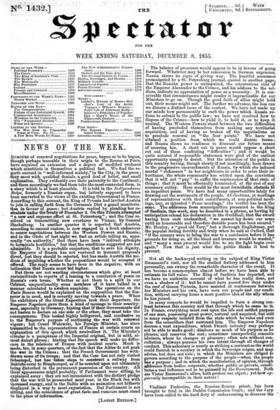The balance of pressures would appear to be in favour
of going forward. Whatever may be her concession to German urgencies, Russia shows no signs of giving way. The boastful assurance promulgated by a St. Petersburg journal, quoted in another page, that the Russian power is unimpaired, the ostentatious visit of the Emperor Alexander to the Crimea, and his address to the sol- diers, indicate no appreciation of peace as a necessity. It is con- ceivable that circumstances might render it impracticable for our Ministers to go on. Though the good faith of allies might hold out, their means might not. The further we advance, the less can we discern a distinct issue of the contest. We have not made up our minds how permanently to curb the power which Russia re- fuses to submit to the public law ; we have not resolved how to dispose of the Crimea—how to yield it, to hold it, or to keep it neutral. The Western Powers stand between the two difficulties of having precluded themselves from making any territorial acquisition, and of having so broken off the negotiations as to preclude renewal on "the four points." We have not attained a position from which we could dictate terms; and Russia shows no readiness to discount our future means of coercing her. A short cut to peace would appear a abort cut out of these conflicting "difficulties"; and it would be quite natural if responsible statesmen were glad of the earliest opportunity simply to desist. But the attention of the public in this country having, though slowly if not unwillingly, been drawn to the progressive encroachments of Russia, by which she induced mortal "sicknesses" in her neighbours in order to seize their in- heritance, the whole community has settled upon the conviction that it will not " pay " to suffer the continuance of that state of things ; that it must be effectually terminated, at the cost of any necessary outlay. Here would be the most formidable obstacle td an imperfect peace. We have had many opportunities lately for drawing out the sentiments of the people. At elections, at meetings Of representatives with their constituents, at non-political meet.. ings, nay, at intended "Peace meetings," the verdict has been the same. The addresses from municipalities presented to the King of Sardinia, this week, may be described in a phrase, as having by anticipation echoed his declaration in the Guildhall, that the sword having been once unsheathed, "we cannot lay down our arms until an honourable and therefore durable peace has been soured."
Mr. Henley, a "good old Tory," but a thorough Englishman, put the popular feeling forcibly and truly when he said at Oxford, that "if the country were to bring the war to a conclusion before it has grounds for doing so, all the blood and treasure would be wasted," and "many a man present would live to see the fight begin over again." Now that is just what the public thinks it best to prevent.


































